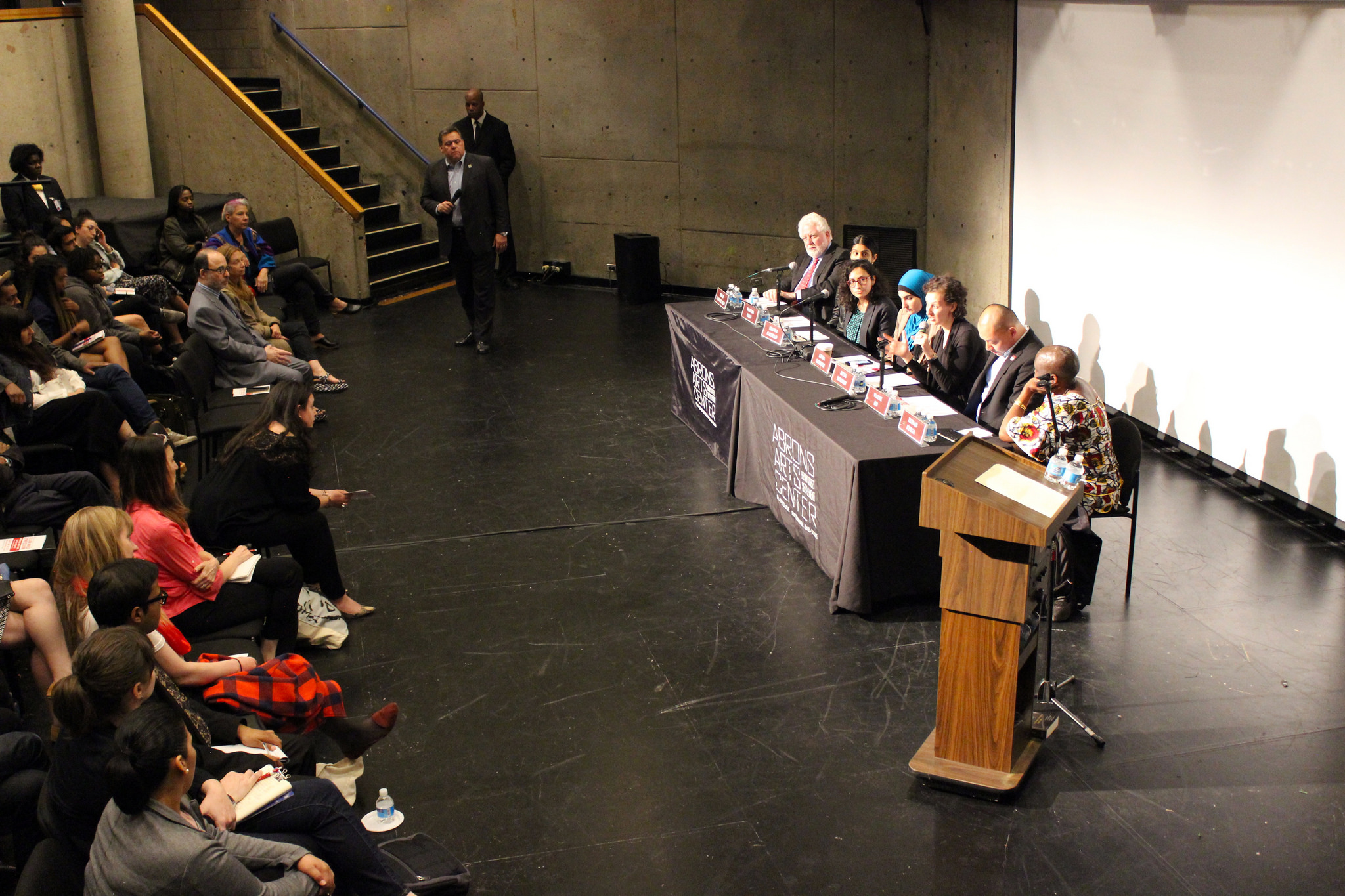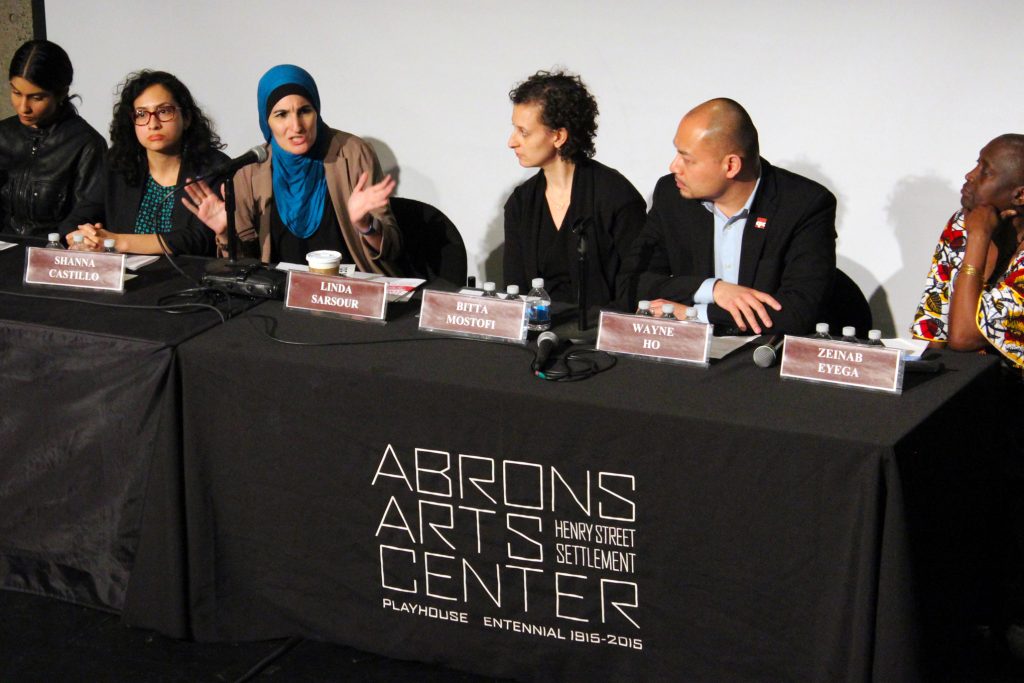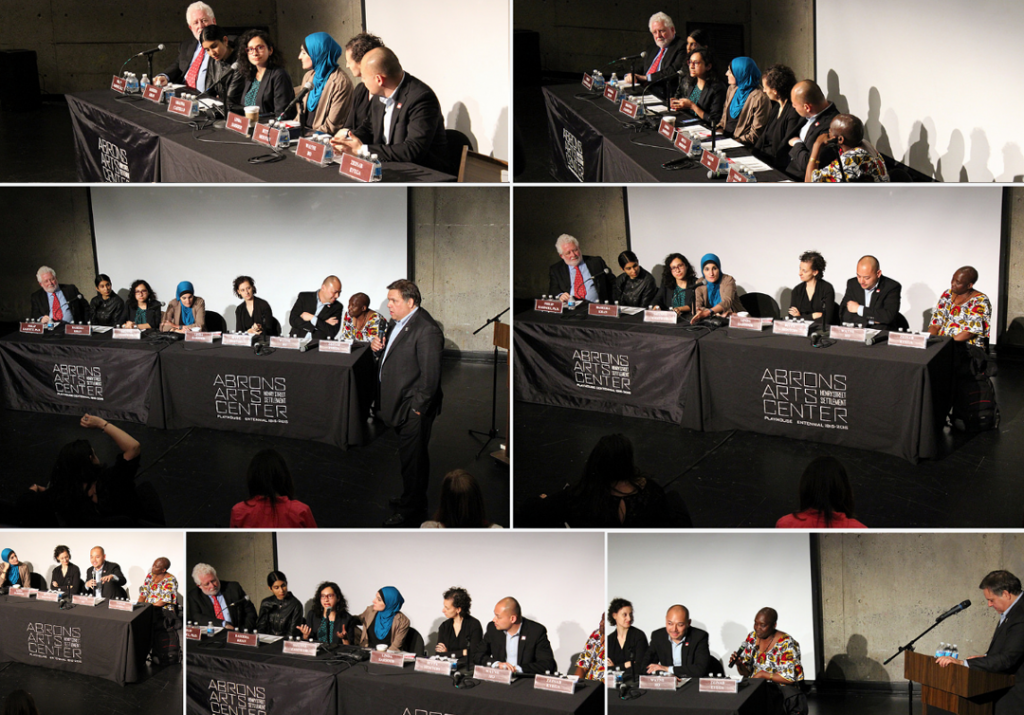Lillian Wald Symposium: Immigrant New York, The New Majority: Policy, Politics and Program
By Henry Street Settlement

(Above: moderator David Garza, center, fields questions from the audience for the panel at the Lillian Wald Symposium.)
There may have been three groups of protesters* on Grand Street last night, but the scene inside the Abrons Arts Center at the Second Annual Lillian Wald Symposium was characterized by a friendly, frank and lively discussion on the issues of immigration in New York.
The topics of the symposium, entitled Immigrant New York, The New Majority: Policy, Politics and Programs, were tackled by a panel of experts: Shanna Castillo, founder of Love Trumps Hate Sunset Park; Zeinab Eyega, Executive Director of Sauti Yetu Center for African Women and Families; Wayne Ho, President and CEO of the Chinese-American Planning Council; Philip Kasinitz, Ph.D., Presidential Scholar of Sociology, CUNY Graduate Center; Baseera Khan, a 2017 Artist in Residence at the Abrons Arts Center; Bitta Mostofi, Assistant Commissioner of the NYC Mayor’s Office of Immigrant Affairs; and Linda Sarsour, racial justice/civil rights activist and former executive director of the Arab American Association of New York. The panel was moderated by David Garza, Executive Director of Henry Street.
“Not only are immigrants the new majority in New York,” said Kasinitz, “but the hundreds of immigrant communities redefine the entire city. And this is nothing new”, adding, “Sh*t’s been like this a long time” to audience laughter.
In a lighthearted moment, Garza “Sean Spicer-ed” the panel and audience, moving with his podium across the floor to mimic the recent Saturday Night Live skit, featuring Melissa McCarthy as the White House press secretary.
The immigrant groups represented by the panelists vary greatly. Eyega said that her clients face three disadvantages in New York: they’re black, immigrants and Muslim. “We have the largest percentage of immigrants deported and the largest numbers in detention centers,” she said. Ho noted that the Chinese were the first group to face legalized anti-immigrant discrimination, with the Chinese Exclusion Act, and that his community, the most impoverished with the largest number of working poor, is often stereotyped by the overachieving student.
Most panelists reported that since President Trump took office, the level of fear has been elevated among the immigrants they serve, much of it justified, in part, because of the rise in hate crimes. “There has been a 240 percent increase in calls to our office from immigrants seeking legal services,” said Mostofi. Sarsour said that as a hijab-wearing Muslim woman, she no longer feels safe taking public transportation, and many in her community feel unsafe walking on city streets. In Castillo’s Sunset Park community, immigrants are afraid to go to medical clinics and food pantries, and many fear that changing jobs will lead to unemployment, since employers are also more fearful. Khan, a Texas native and the daughter of Indian Muslim immigrants, said that fear prompted her to start What’s Next?, a group that encourages acts of kindness, some as simple as swiping someone through the subway turnstile.

(Above, L-R: panelists Baseera Khan, Shanna Castillo, Linda Sarsour, Bittao Mostofi, Wayne Ho and Zeibab Eyega. Not pictured: panelist Philip Kasinitz, Ph.D.)
Panelist all expressed gratitude for New York City’s embrace of immigrants, and its vow to defy rhetoric from President Trump. However, Sarsour is opposed to the “broken windows” policing policy “because it can put immigrants at risk for deportation.” Kasinitz noted that while New York City has a long history of being friendly to immigrants, that effort became much more difficult on January 20. “The elephant in the room,” he said, “is undocumented immigrants. The city deserves credit for defending them.” He said that they – and their children – live under a dark cloud. He noted that undocumented immigrants have been associated with mass criminalization by the current administration. “We need to break the connection between unauthorized individuals and criminals,” said Kasinitz. (Several panelists recited statistics to show that undocumented immigrants are much less likely to commit crimes than citizens.) Mostofi noted that the ID NYC campaign was designed to erase the stigma, and said that undocumented New Yorkers pay billions in taxes. “We need to chip away at this false narrative,” she said.
Sarsour’s solution to immigrant issues (and injustice faced by others) is to define a common enemy. Otherwise, she said, it’s hard to motivate people to action. “Intersectionality is key,” said Sarsour, explaining that all groups facing injustice should ban together rather than advocating separately. The Women’s March, organized by Sarsour and three others, is a perfect example. “We’ve been fighting a long time. But this time, many whites joined because they perceived a common enemy,” she said.
“We have to call out our own prejudices first,” said Ho, who was surprised to learn that several of his staff members hold stereotypes about different Asian groups. Eyega said that we have to make immigrants visible, but advocating is a luxury for her because the need for direct service is so great. Sarsour cautioned about the prevalence of jargon. “We need to make our language accessible,” she said, adding that the emotional appeal of storytelling is also essential.
In response to a question from Garza about how to bridge one’s personal positive experience with immigrants and the anti-immigrant ideology prevalent in America, Kasinitz said he was heartened by the recent bodega strike, which brought to the fore the Yemini immigrants who operate the stores. “It’s difficult to transcend our own biases,” he said. “But that strike by people ‘we hardly know but sort of know’ made their struggles, a conflict a world away, resonate with New Yorkers.”
*The peaceful but loud protesters were drawn to the event by the inclusion of the outspoken Sarsour as a panelist. One group supported her, one was opposed and the third, comprised of orthodox Jews, protested the state of Israel.
Click here or below to see more photos from the 2nd annual Lillian Wald Symposium.

